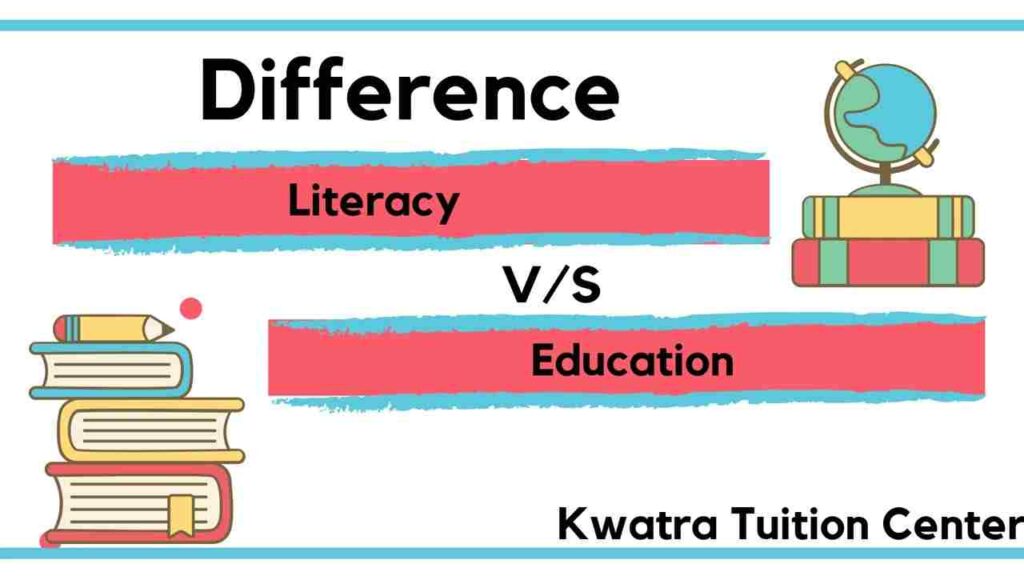
Explore Key 15 Difference between education and literacy
Education and literacy are two concepts often used interchangeably, but they possess distinct characteristics that set them apart. While education encompasses a broad spectrum of learning experiences, literacy refers specifically to the ability to read and write. Let’s delve into 15 key difference that highlight the nuances between education and literacy, shedding light on their unique characteristics.
15 Difference between Education and Literacy
Scope: The broad range of knowledge, abilities, and values that can be learned through formal and informal means are included in education. Literacy, on the other hand, only emphasises the ability to read and write.
Depth of Understanding: While literacy primarily focuses on the fundamentals of reading and writing, education aims to foster a deep understanding of a variety of topics and disciplines.
Application: Literacy is mainly concerned with communication through written language, whereas education promotes critical thinking, problem-solving, and the practical application of knowledge.
Learning Methods: Different pedagogical approaches are used in education, including interactive discussions, group projects, and experiential learning. In contrast, literacy frequently places an emphasis on fundamental abilities like phonics and vocabulary development.
Developmental Stages: Education promotes holistic growth and development throughout a person’s lifetime, from early childhood to adulthood. However, literacy is typically learned during childhood and serves as the basis for further educational endeavours.
Contextual Understanding: Education broadens people’s perspectives on historical, social, and cultural contexts, empowering them to engage in critical thinking about their surroundings. While important, literacy is less able to offer this contextual perspective.
Knowledge Acquisition: Learning involves acquiring knowledge from a variety of fields, including the humanities, sciences, and arts. Language proficiency is the main focus of literacy.
Specialization: Education allows people to specialise in particular fields, honing their expertise and learning in-depth information. Despite being crucial, literacy does not always lead to specialisation.
Holistic development: Education encourages character development, emotional intelligence, social skills, and personal growth, producing well-rounded people. While crucial, literacy is only one part of this larger development.
Social Awareness: Education promotes civic engagement, social responsibility, and an awareness of social issues, which in turn encourages people to be active members of society. The same degree of social consciousness might not be fostered by literacy alone.
Life Skills: Essential life skills like problem-solving, critical thinking, decision-making, and adaptability are taught to people through education. The same range of life skills cannot be provided by literacy alone.
Professional Opportunities: Professional Possibilities: Education provides access to a variety of professions and career paths. Although many jobs require literacy, it might not be enough for higher-level positions.
Personal Growth: Personal Development: Education promotes self-discovery, self-exploration, and the quest for knowledge as a means of achieving personal fulfilment. The transformative experience offered by literacy alone might not be as strong.
Cultural Appreciation: Education encourages tolerance, cultural appreciation, and understanding, fostering a diverse and inclusive society. Although necessary, literacy does not necessarily promote the same degree of cultural appreciation.
Lifelong Learning: Education fosters a love of learning and encourages people to continue learning throughout their lives in order to constantly advance their knowledge and abilities. Despite being fundamental, literacy does not automatically inspire the same enthusiasm for lifelong learning.
Education encompasses a wider spectrum of learning experiences, nurturing intellectual growth, personal development, and social awareness, even though literacy serves as a fundamental foundation. Both are crucial, but education provides a more thorough and transformative path to wisdom and enlightenment.
Also Read: Explore Key 15 Difference between Arbitration and Conciliation